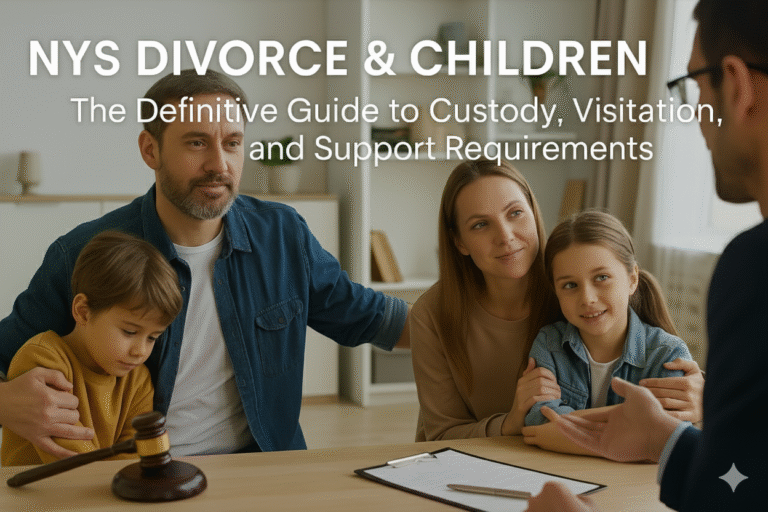NYS Divorce: The Definitive Guide to Custody, Support & Visitation
Getting a divorce in New York State with children doesn’t have to mean a court battle. An uncontested divorce is possible when you and your spouse agree on all critical issues, including child custody, visitation, and support.
In an uncontested case, the court doesn’t decide these issues. Instead, it simply reviews and approves your agreement to ensure it meets legal standards and protects the child’s best interests. Therefore, your comprehensive Settlement Agreement serves as the foundation of your final divorce judgment.
1. Defining Custody & Visitation in Your Agreement
For an uncontested divorce to proceed, you must clearly document your parenting arrangement for all children under the age of 18.
Custody (Decision-Making & Residency)
Your agreement must define both Legal Custody and Physical Custody:
- Legal Custody (Decision-Making): Do you agree to Joint Legal Custody (co-parenting decisions on health, education, religion) or Sole Legal Custody (one parent makes all major decisions)?
- Physical Custody (Residency): Who will the child live with primarily? This determines the Custodial Parent. Even so, one parent is often designated as the CP for technical purposes, even in a 50/50 time-share.
Visitation (Parenting Time)
Your agreement should include a detailed schedule for Visitation, often called “Parenting Time.”
- Fixed Schedule: Always include more detail. Specify regular weekly time, holiday rotation (e.g., alternating Thanksgiving and Christmas), school breaks, and summer vacation. Clearly, a detailed schedule prevents future conflicts.
- Reasonable Visitation: The parents will arrange parenting time by mutual agreement, based on the children’s needs and their availability. Ultimately, this flexible approach works best when both parties have open lines of communication and a high level of trust.
2. Mandatory Child Support Requirements
New York law requires parents to support their children financially until the age of 21 (unless emancipated earlier). Thus, your agreement must comply with the Child Support Standards Act (CSSA) OR you must agree to deviate from the CSSA.
Calculation and Documentation
To finalize your uncontested divorce, you must complete and file the Child Support Worksheet (UD-8(3)). This form demonstrates how the support amount was calculated.
- Combined Income: First, you must determine the combined parental income (up to the current statutory cap).
- Statutory Percentage: Next, multiply this income by the legal percentage based on the number of children (e.g., 17% for one child, 25% for two).
- Proportional Share: Finally, divide the basic child support obligation between the parents according to their respective incomes.
The Deviation Agreement
You and your spouse may agree to a child support amount that differs (higher or lower) from the CSSA guidelines. However, to do this, your agreement must explicitly state:
- What the official CSSA amount would have been.
- The specific reason(s) why you are deviating from that amount.
Health Insurance
Your agreement must also address health insurance expenses, including:
- Health Insurance: Coverage for the child.
- Unreimbursed Medical Expenses: Co-pays, deductibles, etc.
3. The Court’s Mandatory Registry Check Requirements
Even in a fully uncontested divorce where you and your spouse have reached complete agreement, the New York State Supreme Court has an independent duty to ensure the child’s safety.
Before approving a divorce judgment involving minor children, the court mandatorily performs background checks on both parents. This is done by querying specialized government registries.
What the Court Checks For:
- Child Abuse/Neglect: The court checks the Statewide Central Register of Child Abuse and Maltreatment (SCR). Consequently, if an open or substantiated case is indicated, the court may refuse to approve the custody and visitation terms until the issue is investigated.
- Domestic Violence: Checks may be conducted against the Family Court Registry for any existing Orders of Protection or history of family offenses involving either party or the children.
This check underscores that the court retains the final authority to protect the child’s best interests, even when parents agree. Therefore, any red flags raised by these checks could lead the judge to request a hearing or demand additional information before signing the final judgment.
Start Your Online Divorce Today
If you and your spouse agree on all major issues, an uncontested online divorce may be the easiest solution. Let We The People NYC prepare your documents for a flat fee, so you can focus on your future instead of paperwork.
Get started today and discover how easy online divorce can be.

